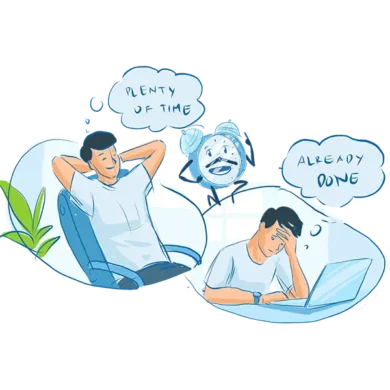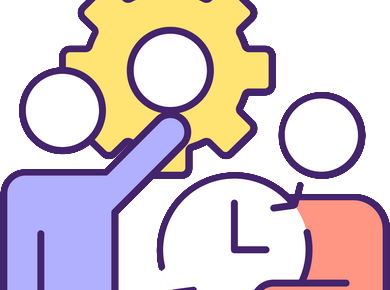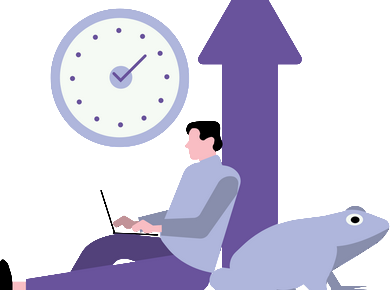The opposite of procrastination is what those who do it daily might want to happen to them.
Indeed, any procrastinator, fed up with all the inconveniences that this habit creates, has often wondered:
– What if my course of action were the opposite of procrastination?
Let’s think about that for a moment and see if it is really desirable.
Would it be good for our actions to take place in a completely opposite way of procrastination?
Generally speaking, extremes are wrong. It is much more advantageous to find a middle ground, a balanced way of doing things. To specifically address the opposite of procrastination, let’s first find out what we’re dealing with.
What is procrastination?
Procrastination is a common behavior in almost all people, and its occurrence is related to the lack of self-regulatory ability.
It’s all about our feelings, procrastination is the misregulation of emotion. We think that by putting things off, we’re going to feel better.
Tim Pychyl, Ph.D., Associate Professor of Psychology at Carleton University

Side note
Self-regulation is one’s ability to control oneself to manage one’s thoughts, feelings, and actions to resist impulsive behavior and adjust one’s reactions and behavior. Examples of a lack of self-regulatory abilities may include overeating, drinking too much, and compulsive gambling or shopping.
In some situations, although we are aware that there will be negative consequences, we tend to postpone the start or completion of important activities unjustifiably. The interesting fact is that sometimes we choose to do anything else that comes to mind, not what we should.
To a greater or lesser degree, most of us have procrastinated at some point:
- Some students finish writing their papers or cram their studies the night before the exam, even though they know about the assignment all semester.
- Others update their resume the morning before the interview, even though they knew about it a week before.
- Some employees hand over projects prepared superficially or with errors, precisely because they took care of them immediately before the meeting, although they had received the task a few days previously.
To some extent, procrastination is not a bad thing, and there are very few people who do not procrastinate at all.
But, taken to extremes, this behavior becomes a problem. Its severity depends on the degree to which its negative consequences affect us.
It’s not the delay that’s the problem. It’s the self-blame and the emotional disengagement that leads to internal struggles that undermine your health.
Tim Pychyl, Ph.D., Associate Professor of Psychology at Carleton University
The etymology of the term procrastination
The term procrastination derives from:
- the Latin “procrastinare” (procrastino, procrastinavi, procrastinatus) and has the meaning of delaying or postponing, or putting off till the next day;
also from
- the ancient Greek “akrasia” means a lack of command over oneself, or “the state of acting against one’s better judgment.”
Procrastination vs. laziness
Procrastination defines something other than laziness. In this regard, things become more evident if we consider the etymology presented above.
People who procrastinate know what they should do but deliberately choose to postpone activities. They do this even though they are aware that they will face repercussions.
Instead, they are apathetic and do not want to make any effort, physical, mental, or intellectual. Instead, they prefer to remain inactive or carry out their activity superficially.
Procrastination vs. delay
Many times in our daily lives, we postpone certain activities. But, of course, we do this knowingly and willingly, and these delays are sometimes necessary.
However, when we resort to postponements that are unnecessary and lack a plausible justification, especially when we know that this will affect us and that there will be repercussions, it is about procrastination.
What is the opposite of procrastination?
Procrastination means we know what and when we have to do something, yet we:
- consciously postpone the initiation or performance of an activity
- postpone it for no particular reason
- are fully aware that this will negatively influence us in terms of achieving the goal we are aiming for
- know that we will feel psychological distress like shame, guilt, disappointment, and lack of fulfillment
Thus, the opposite of procrastination means that although we have the necessary time available, we:
- start doing the activity much earlier than necessary
- do it in a hurry to get rid of it
- get it done as soon as possible (sooner rather than later)
- try to finish it well before the deadline
As opposed to procrastination, this way of acting is called precrastination, and it is just as common in our daily lives.
Revealing examples in this regard are given by Edward A. Wasserman, Stuit Professor of Experimental Psychology, in his paper Precrastination: The fierce urgency of now. He identifies it with the way we check and reply to our emails, the way we pay our bills or the way we shop when we enter a larger store.
People immediately respond to emails rather than carefully considering the possible consequences of their hasty replies.
E.A. Wasserman, Precrastination: The fierce urgency of now. Learn Behav 47, 7–28 (2019)
Purchasers pay bills as soon as they arrive, thereby foregoing interest income on their savings.
And shoppers snatch items from the shelves when they first enter a market, carry them to the back of the store, grab still more groceries, and then return to the front of the market to pay, in the process toting the initial items much farther than necessary.
The answer is definitely yes. It is the word that expresses the opposite of procrastination, and it is relatively new.
It appeared in 2014, being introduced by David A. Rosenbaum and his colleagues in their paper Pre-Crastination: Hastening Subgoal Completion at the Expense of Extra Physical Effort.
On the basis of results from nine experiments and participants’ reports, we concluded that this seemingly irrational choice reflected a tendency to pre-crastinate, a term we introduce to refer to the hastening of subgoal completion, even at the expense of extra physical effort.
2014, David A. Rosenbaum, Lanyun Gong, Cory Adam Potts,
Pre-Crastination: Hastening Subgoal Completion at the Expense of Extra Physical Effort
Later, in his 2017 book Knowing Hands: The Cognitive Psychology of Manual Control, the author points out once again that this term was explicitly created to describe the opposite of procrastination.
My colleagues and I called this tendency ‘precrastination.’ The term was meant to connote the opposite of procrastination, the tendency to put off until later what you can do right away.
2017, David A. Rosenbaum, Knowing Hands: The Cognitive Psychology of Manual Control
Although the term itself is new, the notion it represents is not new at all.
E . A . Wasserman explains that the title of his work, Precrastination: the fierce urgency of now, includes the famous slogan the fierce urgency of now,
which is a quote from Martin Luther King, Jr
We are now faced with the fact that tomorrow is today. We are confronted with the fierce urgency of now. In this unfolding conundrum of life and history, there ‘is’ such a thing as being too late. This is no time for apathy or complacency. This is a time for vigorous and positive action.
In his paper, Wasserman emphasizes, Precrastination is a lesser-known and explored tendency: completing tasks quickly just to get them done sooner.
Synonyms for procrastination & precrastination
The notions expressed by the two terms are in opposition. Therefore, the synonyms for procrastination will represent antonyms for precrastination and vice versa.
Synonyms for procrastination
(to put off doing something)
- Avoidance
- Waiting
- Delay
Synonyms for precrastination
(to deal with something beforehand)
- Alacrity (promptness in response, cheerful readiness)
- Eagerness
- Readiness
- Precipitation (acting suddenly and rashly)
- Expedite (to accelerate the progress of)
Procrastination vs. precrastination
Neither is desirable. As we have seen, it would be preferable to find a middle ground. According to Dr. Tim Pychyl, Procrastination is an emotion regulation problem, not a time management problem.
The same is true for precastination, the opposite of procrastination.
And, yes, time management is not the problem in these situations, but it can be a beneficial element in solving them.
What is a procrastinator?
A procrastinator is a person who tends to postpone things until the last moment and then do them in a hurry, compromising on quality. Throughout this process, he will stress over the fact that he has something to do or has not yet started, or that he has not completed what he had to do in time.
Why do we procrastinate?
Self-doubt or the fear of failure
If we fear that what we do will not live up to specific standards imposed (by us or others), we will be reluctant to start that activity.
Insecurity or anxiety
Sometimes we have the impression that the circumstances are not yet perfect or that we are not yet in the necessary state of mind. We are waiting for the right moment, which never seems to come.
Boredom
If the activity we have to complete is a routine one, or if it does not arouse our interest, we will tend to postpone taking action simply because we don’t feel like doing it.
Unconscious avoidance
This will happen with tasks that we find stressful or unpleasant, precisely because we prefer to carry out any other activity to our liking.
What is a precrastinator?
A precrastinator is a person who feels stressed out about the thought that he has something to do. Therefore, he will start that activity immediately, out of the desire to get rid of it as soon as possible. Most of the time, in the process, he will compromise on quality.
As we can see, in both situations, the person involved is affected by stress and dissatisfaction, resulting in decreased efficiency and productivity. Therefore, these are the factors that should be taken into account when trying to find the middle ground.
Why do we precrastinate?
The same factors that cause some people to procrastinate can be the triggers of precastination. The latter will tend to act quickly to get rid of the “problem.”
Self-doubt or fear of failure
We will act and end the activity as soon as possible so that we don’t have to think about whether or not we can live up to the imposed standards.
Insecurity or anxiety
We will try to avoid these feelings by completing the task sooner rather than later, so as not to prolong the stressful period.
Boredom
We know that if the activity does not arouse our interest now, it will not seem more interesting later. Thus, we decide that we had better start it and end it quickly, and then move on to more exciting things.
Unconscious avoidance
Precrastinators will quickly perform stressful or unpleasant tasks to avoid prolonging the unpleasant feelings.
How do I stop precrastinating (or procrastinating)?
In both situations, the solution is finding a middle ground and being careful not to go from one extreme to another.
In this regard, time management can help us a lot. But, of course, it is essential to admit that we have a problem and identify which one it is. Subsequently, we must want to solve it.
This is not a very simple process because it is not easy to break bad habits or fight your own emotions. However, it is certainly possible. All you need is determination.
Set priorities
Not all activities are equally important or urgent. First, determine what is most important to you; then, keep that in mind when you do your planning. Then, quickly run, through the Urgent-Important matrix, the tasks you don’t know at first glance how to classify. This can help you make the right decisions.
Plan ahead
Plan your next week during the previous weekend and every day the night before. SWDH is a productivity system that works perfectly for this.
It will help you start your day much more relaxed because you will know precisely what you have to do every morning. Then, you can get to work without wasting precious time trying to identify with what to start.
Do your planning directly in the Calendar so that you can see the big picture and avoid overloading your schedule or overlapping tasks.
Set deadlines and track your time
It is preferable to divide large projects into smaller activities and tasks so that you can set milestones for each of them. Then, track your time as you work on activities. This will make it easier for you to keep yourself accountable. When you know exactly what the difference is between what you set out to do and what you actually did, it’s easier to correct your flaws.
Stick to your schedule
Trust yourself that you thought about that schedule when you did it and that if you set a certain number of hours, it means it’s the right one. Of course, you can be flexible with your plans but stick to your to-do list as much as possible.
Celebrate each victory
Every achievement, big or small, is a powerful motivator. Take advantage of that. Enjoy each achievement and give yourself a small reward.
Don’t worry too much if you slip up. Just get back on track and keep going. Habits do not change overnight, but you will get there. You will enjoy meeting your deadlines easily, and especially doing so without stress.
Procrastination quotes
Procrastination is the bad habit of putting off until the day after tomorrow what should have been done the day before yesterday.
Napoleon Hill
In a moment of decision, the best thing you can do is the right thing to do. The worst thing you can do is nothing.
Theodore Roosevelt
If it weren’t for the last minute, nothing would get done.
Rita Mae Brown
There are a million ways to lose a workday, but not even a single way to get one back.
Tom DeMarco
Take time to deliberate; but when the time for action arrives, stop thinking and go in.
Napoleon Bonaparte
To think too long about doing a thing often becomes its undoing.
Eva Young
Much of the stress that people feel doesn’t come from having too much to do. It comes from not finishing what they started.
David Allen
Delay is the deadliest form of denial.
C. Northcote Parkinson
Delay is the You don’t have to see the whole staircase, just take the first step. deadliest form of denial.
Martin Luther King Jr.
Delay is the You don’t have to see the whole staircase, just take the first step. deadliest form of denial.
Martin Luther King Jr.
Books on procrastination
- Solving the Procrastination Puzzle: A Concise Guide to Strategies for Change, by Tim Pychyl
- Stop Procrastinating: A Simple Guide to Hacking Laziness, Building Self Discipline, and Overcoming Procrastination, by Nils Salzgeber
- Eat That Frog!: 21 Great Ways to Stop Procrastinating and Get More Done in Less Time, by Brian Tracy
- Getting Things Done: The Art of Stress-Free Productivity, by David Allen
- The Power of Habit: Why We Do What We Do in Life and Business, by Charles Duhigg
- Addiction, Procrastination, and Laziness: A Proactive Guide to the Psychology of Motivation, by Roman Gelperin
- The Procrastination Cure: 21 Proven Tactics For Conquering Your Inner Procrastinator, Mastering Your Time, And Boosting Your Productivity!, by Damon Zahariades
- The More You Do The Better You Feel: How to Overcome Procrastination and Live a Happier Life, by David Parker
- The Procrastination Cure: 21 Proven Tactics For Conquering Your Inner Procrastinator, Mastering Your Time, And Boosting Your Productivity! by Damon Zahariades








